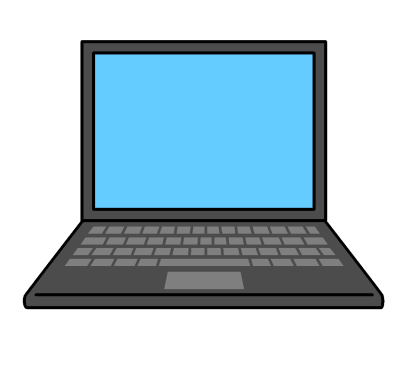» Read this notice in an easy-to-understand format
NOTICE OF PROPOSED CLASS ACTION SETTLEMENT ABOUT THE RIGHTS OF PERSONS WITH DISABILITIES EXPERIENCING HOMELESSNESS IN THE CITY OF LAGUNA BEACH
This notice is about a proposed settlement of a class action lawsuit against the City of Laguna Beach and the Laguna Beach Police Department involving alleged violations of Title II of the Americans with Disabilities Act (ADA) and section 504 of the Rehabilitation Act of 1973 (RA).
ABOUT THE LAWSUIT:
On August 20, 2015, five persons with disabilities experiencing homelessness who claimed to live in the City of Laguna Beach filed this lawsuit, entitled Kenneth Glover et al. v. City of Laguna Beach et al. The lawsuit alleges that certain services, programs and activities offered by the City of Laguna Beach and its Police Department for individuals experiencing homelessness are inadequate and inaccessible to persons with disabilities, thereby violating Title II of the ADA and section 504 of the RA. The lawsuit also alleged that the City of Laguna Beach and its Police Department violated the Eighth and Fourteenth Amendments to the United States Constitution (and similar provisions of the California Constitution) by enforcing against certain individuals with disabilities experiencing homelessness Laguna Beach Municipal Code Sections 8.30.030 (prohibiting unlawful camping and sleeping in public areas) and 18.05.020 (prohibiting entering, remaining, or staying on beaches or in public parks during closing times) as well as California Penal Code Section 647(e) (prohibiting lodging on public or private property without permission). The lawsuit further alleged that the City of Laguna Beach and its Police Department violated the Fourteenth Amendment to the United States Constitution (and a similar provision of the California Constitution) by knowingly exposing individuals with disabilities experiencing homelessness to increased risk of danger. The lawsuit requested that the Court order the City of Laguna Beach and its Police Department to stop enforcing the above code sections against individuals who the lawsuit claimed to have no practical way to comply by virtue of their disabling condition(s) and homelessness as well as to create and/or fund alternative accessible legal places to sleep, such as permanent supportive housing, to individuals with disabilities experiencing homelessness who live in or relocate to Laguna Beach. The City of Laguna Beach and its Police Department denies any and all allegations of wrongdoing.
In November 2015, the homeless individuals requested that the Court prevent the City of Laguna Beach and its Police Department from enforcing the above code sections and also from discriminating against individuals with disabilities experiencing homelessness until the lawsuit was decided. In February 2016, the Court denied that request. In June 2017, the Court ordered summary judgment of the Constitutional claims in favor of the City of Laguna Beach, thereby dismissing those claims from the lawsuit. The Court also certified the ADA and RA claims in the lawsuit as class claims, and ordered that the van provided by the City to transport individuals to and from the ASL be equipped with ramps or lifts.
The parties have reached a settlement of the claims that were certified as class claims, and this notice provides details of that settlement.
THE PARTIES:
Formerly homeless individuals with disabilities Michael Newman, David Sestini, and Richard Owens ("Plaintiffs") represent a class of individuals certified by the Court, which is defined as "[a]ll homeless persons who reside or will reside in the geographic area of Laguna Beach who have a mental and/or physical disability as defined under section 504 of the Rehabilitation Act and Americans with Disabilities Act" ("the Plaintiff Class"). The Defendants in the case are the City of Laguna Beach and the Laguna Beach Police Department. If you are a homeless person with a disability who lives or will live in the City of Laguna Beach, you are a member of the Plaintiff Class in this case.
ABOUT THE SETTLEMENT:
The following is only a summary of the provisions of the settlement. The written agreement between the parties has the full terms of the proposed settlement that was preliminarily approved by the Court. There are instructions below if you want more information about this settlement, including a copy of the complete agreement. The settlement is for non-monetary relief only, which means that the parties are agreeing that the City of Laguna Beach and the Laguna Beach Police Department will continue certain actions that they already take and will take certain additional actions to ensure compliance with Title II of the ADA and section 504 of the RA and address those claims in the lawsuit. The settlement does not entitle you or any member of the Plaintiff Class to money damages, i.e., a cash payment.
The Contents of the Settlement
Plaintiff Class releases: The Plaintiff Class will release all claims in this lawsuit that the Court allowed to be pursued on behalf of the Plaintiff Class (specifically, all ADA and RA claims asserted against the Defendants), including the Plaintiff Class's claims that the City of Laguna Beach is required to create and fund a program to provide permanent supportive housing to individuals with disabilities experiencing homelessness. The Plaintiff Class will also release all claims based on future events that are substantially similar to the events on which this lawsuit was based.
Public Expressions of Support for Orange County and Laguna Beach efforts to end homelessness
- The City of Laguna Beach will express public support for Orange County's "10 Year Plan to End Homelessness" (a "Housing First" plan that would increase countywide availability of permanent supportive housing).
- A member of the Plaintiffs Class Counsel team will express public support for the City of Laguna Beach's efforts to end homelessness.
The City's ADA Coordinator
- The City of Laguna Beach will continue to designate a full time City employee as an ADA coordinator (a person trained on disability rights whose job it is, in consultation with other City employees and third-party experts, to make the City's programs and structures, including the shelter known as the Alternative Sleeping Location or ASL, accessible to individuals with disabilities).
- The City of Laguna Beach will expand the responsibilities of the ADA Coordinator to include several specified responsibilities relating to the ASL and its operations.
The City's reasonable accommodation policy and complaint procedure
- The City of Laguna Beach will post at the Laguna Beach Police Department its existing procedures for addressing requests by individuals for reasonable accommodations of their disabilities and for independently reviewing complaints by individuals alleging that the City has discriminated against them based on disability.
- The City of Laguna Beach will adapt these two procedures to create modified procedures applicable specifically to the ASL. The City of Laguna Beach will post notice of these modified procedures at the ASL.
Conditions and operations of the City shelter, common known as the ASL
- The City of Laguna Beach and the ASL staff will formalize procedures to facilitate individuals knowing about their right to request, and ASL staff's responsibility to consider, reasonable modifications of ASL conditions, policies, or procedures to accommodate known or obvious disabilities. ASL staff decisions can be appealed to the ADA Coordinator.
- The ASL will provide the following accommodations:
- As a trial program, at least three private or semi-private sleeping areas for those whose disabling condition requires those areas OR transport those individuals to another shelter that can provide more private or semi-private sleeping areas;
- At least four elevated cots or beds for those whose disability requires them;
- Access to electrical outlets for disability-related equipment;
- Refrigeration available for medication; and
- Ability to exit and enter the ASL if disabling condition requires it, subject to appropriate conditions to be communicated by ASL staff.
- The ASL will post policies about bathroom access (that will make accommodation for those with disabilities).
- The City and the ASL will adopt new goals intended to prioritize access for the most vulnerable (including those with disabilities) and to make it easier for individuals to know if they will get overnight access. The City and the ASL will develop a trial program to modify the rules for access to the ASL to achieve these goals. Under the pilot, spots will be reserved for locals. Additional spots will be reserved for "enrolled" persons – prioritized by vulnerability and given a spot for up to 30 days (with a possibility of renewal based on needs and plan and efforts to get housing). Five spots will be reserved for others determined by ASL staff and City. The ASL will be open for three hours for "drop-in" services (including laundry, case management) during the day; overnight spots will be given out at close of drop-in hours.
- The ASL will continue to train its staff on a variety of subjects, including how to identify and interact with individuals with mental health disabilities and the requirements of the ADA and RA, to enable staff to effectively serve individuals with disabilities.
- The ASL will continue case management at the ASL so long as it continues to receive funding from outside sources.
- The ASL will modify and post its list of rights and responsibilities for users of the ASL.
- The ASL will modify and post its process for allowing anyone previously exited indefinitely to get back in.
- The ASL will clarify and post the rule for determining who can be exited from the ASL:
- Individuals with disabilities will be exited for disability-related conduct only if they pose a direct threat to the health and safety of others or for illegally using drugs;
- All decisions to exit individuals will be documented in writing with a copy given to the individual exited.
- Laguna Beach Police Department policies
- The LBPD's Community Outreach Officers will remain abreast of the prevalence of the most common disabling conditions among individuals experiencing homelessness in Laguna Beach and the common signs and symptoms of those conditions.
- The LBPD's Community Outreach Officers will meet and coordinate with the City's ADA Coordinator and know how to refer individuals to the City's ADA grievance process in the event that they desire to make a complaint under such procedure.
- The City will evaluate other training for all officers relating to identification and interaction with individuals with disabilities experiencing homelessness.
- Transportation: The City of Laguna Beach will make sure the transportation van provided by the City to transport people to and from the ASL will have a ramp/lift.
- Job/volunteer opportunities: The City of Laguna Beach will post job/volunteer opportunities at the ASL.
IF YOU WANT MORE DETAILS:
There is a group of lawyers, Glover Plaintiffs' Class Counsel, representing Plaintiffs and the Plaintiffs Class in this case. You can get a list of these lawyers and a copy of the settlement agreement from the following website: http://aclusocal.org/glover.
You can get an easy-to-read version and an audio version of the settlement agreement at this website: http://aclusocal.org/glover.
To ask questions about the settlement of this case you can:
- Send a letter to Glover Plaintiffs' Class Counsel, c/o ACLU of Southern California,
1313 West 8th Street, Los Angeles, CA 90017. - Send an email to glover_laguna@aclusocal.org.
- Leave a voicemail at 714-221-2788.
IF YOU DO NOT OBJECT TO THIS SETTLEMENT:
You do not have to do anything.
IF YOU OBJECT TO THIS SETTLEMENT:
You must mail a statement explaining why you object to the settlement. The deadline is September 17, 2018. Please be sure to include your name, address (if available), telephone number (if available), your signature, a reference to this settlement or the case (Kenneth Glover et al. v. City of Laguna Beach et al.), the portions of the settlement to which you object, and the reasons you object. Mail your objection to:
Glover Plaintiffs' Class Counsel
c/o ACLU of Southern California
1313 W. 8th Street
Los Angeles, CA 90017
Glover Plaintiffs' Class Counsel will provide your objection to the federal judge assigned to this matter, the Honorable Andrew J. Guilford, and to Defendants' Counsel. You must mail your objection by the above deadline; you cannot object to this settlement after the deadline has passed. Even if you object, you do not have the ability to "opt out" of this settlement if the Court approves it.
HEARING REGARDING FINAL APPROVAL OF THIS SETTLEMENT:
The Court will also hold a hearing about this settlement on November 5, 2018. The hearing date could change. Please check any of the websites listed above close to the date of the hearing for information about any possible change in the hearing date. The Court gets to decide whether to allow members of the Plaintiff Class who timely served objections to this settlement to speak at the hearing.
The address for the court is:
U.S. Federal District Court, Courtroom 10 D
411 West 4th Street
Santa Ana, CA 92701-4516
You can get more details about the hearing from the places listed above.
Download this information in a PDF document.
NOTIFICACIÓN DEL ACUERDO PROPUESTO DE LA DEMANDA COLECTIVA SOBRE LOS DERECHOS DE LAS PERSONAS CON DISCAPACIDADES PASANDO POR FALTA DE VIVIENDA EN LA CIUDAD DE LAGUNA BEACH.
Esta notificación es sobre un acuerdo propuesto de una demanda colectiva en contra de la ciudad de Laguna Beach y el departamento de policía de Laguna Beach involucrando supuestas violaciones del Título II de la Acta de Americanos con Discapacidades (ADA) y sección 504 de la Acta de Rehabilitación del 1973 (RA).
SOBRE LA DEMANDA:
El 20 de agosto del 2015, cinco personas con discapacidades pasando por falta de vivienda quienes aseguran vivir en la ciudad de Laguna Beach presentaron la demanda titulada Glover et al. v. City of Laguna Beach el al. La demanda alega que ciertos servicios, programas y actividades que ofrecen la ciudad de Laguna Beach y el departamento de policía de Laguna Beach para individuos pasando por falta de vivienda, son inadecuadas e inaccesibles para personas con discapacidades, de este modo, violando el Titulo II de la ADA y sección 504 del RA. La demanda también alega que la ciudad de Laguna Beach y su departamento de policía violaron el octavo y decimocuarto enmiendas de la constitución de los Estados Unidos (y provisiones parecidas de la constitución de California) por imponer en contra de ciertos individuos con discapacidades pasando por falta de vivienda código municipal secciones 8.30.030 (prohibir acampamento ilegal y dormir en áreas públicas) y 18.05.020 (prohibir el entrar, permanecer, o quedarse en playas o en parques públicos durante horas de cierre) al igual que código penal de California sección 647(e) (prohibir alojamiento en propiedad pública o privada sin permiso). La demanda además alega que la ciudad de Laguna Beach y su departamento de policía violaron la decimocuarta enmienda de la constitución de los Estados Unidos (y una provisión parecida de la constitución de California) por exponer a propósito a individuos con discapacidades pasando por falta de vivienda a un riesgo aumentado al peligro. La demanda solicito que el tribunal ordene a la ciudad de Laguna Beach y su departamento de policía pongan un alto a imponer los códigos mencionados anteriormente contra los individuos quienes la demanda reclama no tener manera práctica de cumplir por virtud de sus condiciones incapacitantes y falta de vivienda además de crear y/o financiar lugares legales y accesibles alternativos para dormir, como vivienda permanente de apoyo para individuos con discapacidades pasando por falta de vivienda que viven, o se mudaron a Laguna Beach. La ciudad de Laguna Beach y su departamento de policía niega cualquier y todas alegaciones de delito.
En noviembre del 2015, los individuos con falta de vivienda solicitaron que el tribunal impida que la ciudad de Laguna Beach y su departamento de policía imponga los códigos mencionados anteriormente y también de discriminar contra individuos con discapacidades pasando por falta de vivienda hasta que la demanda sea decidida. En febrero del 2016, el tribunal negó la solicitud. En junio del 2017, el tribunal ordeno juicio sumario de las declaraciones constitucionales en favor de la ciudad de Laguna Beach, de esa manera, despidiendo esos reclamos de la demanda. El tribunal también certifico los reclamos del ADA y RA en la demanda como reclamaciones colectivas, y ordeno que la camioneta provista por la ciudad para trasladar individuos hacia y del ASL serán equipadas con rampas y elevador.
Las partes han llegado a un acuerdo de las reclamaciones que fueron certificadas como reclamaciones colectivas, y esta notificación provee detalles de ese acuerdo.
LAS PARTES:
Individuos con discapacidades que anteriormente estaban sin hogar, Michael Newman, David Sestini, and Richard Owens ("demandantes") representan la clase de individuos certificado por el tribunal, que está definida como "todas las personas sin hogar que residen o van a residir en la área geográfica de Laguna Beach que tienen una discapacidad mental y/o física como es definida bajo la sección 504 de la Acta de Rehabilitación y la Acta de Americanos con Discapacidades" ("la clase de demandantes"). Los demandados en el caso son la ciudad de Laguna Beach y el departamento de policía de Laguna Beach. Si usted es una persona con falta de vivienda con discapacidad que vive o va a vivir en la ciudad de Laguna Beach, usted es miembro de la clase de demandantes en este caso.
SOBRE EL ACUERDO:
Lo siguiente es solo un resumen de las provisiones del acuerdo. El convenio escrito entre las partes tiene los términos completos del acuerdo propuesto que fue preliminarmente aprobado por el tribunal. Hay instrucciones abajo si quiere más información sobre el acuerdo, incluyendo una copia del convenio completo. El acuerdo es para alivio no monetario, que significa que las partes están de acuerdo que la ciudad de Laguna Beach y el departamento de policía de Laguna Beach continuaran ciertas acciones que ya han tomado y tomaran ciertas acciones adicionales para asegurar cumplimiento con Titulo II del ADA y sección 504 del RA y abordar las reclamaciones de la demanda. El acuerdo no le concede a usted o cualquier miembro de la clase de demandantes a dinero para daños, i.e., un pago en efectivo.
Los contenidos del acuerdo
Renuncias de la clase de demandantes: La clase de demandantes van a revelar todas declaraciones en esta demanda que el tribunal permitió ser discutido por la clase de demandantes (específicamente todas declaraciones de ADA y RA contra los demandados), incluyendo las declaraciones de la clase de demandantes que la ciudad de Laguna Beach es obligada a crear y financiar un programa para proveer apoyo de vivienda permanente para individuos con discapacidades pasando por falta de vivienda. La clase de demandantes también va revelar todas las declaraciones basadas en eventos futuros que sean esencialmente parecidos a eventos en el cual la demanda esta basada.
Expresiones públicas en apoyo hacia los esfuerzos del condado de Orange y Laguna Beach, para terminar la falta de vivienda
- La ciudad de Laguna Beach expresara apoyo público para el "Plan de terminar la falta de vivienda en 10 años" del condado de Orange (un plan de "Vivienda Primero" que aumentaría disponibilidad de vivienda apoyada permanent, por todo el país)
- Un miembro de la consejería de la clase de demandantes expresara apoyo público hacia los esfuerzos de la ciudad de Laguna Beach para poner fin a la falta de vivienda
Coordinador del ADA de la ciudad
- La ciudad de Laguna Beach continuara a designar un empleado de la ciudad de tiempo completo como coordinador del ADA (una persona calificada en derechos de discapacidades cuyo trabajo es, en consulta con otros empleados de la ciudad y expertos externos, para hacer los programas y esquema de la ciudad, incluyendo el albergue conocido como Alternative Sleeping Location o ASL, accesible para individuos con discapacidades).
- La ciudad de Laguna Beach va ampliar las responsabilidades del coordinador de ADA para incluir varias responsabilidades específicamente relacionadas con ASL y sus operaciones.
La póliza de alojamiento razonable y procedimiento de denuncias
- La ciudad de Laguna Beach va a publicar en el departamento de policía sus procedimientos para responder a peticiones de individuos para acomodaciones razonables por sus discapacidades y para independientemente revisar quejas de individuos alegando que la ciudad ha discriminado contra ellos basado en discapacidad.
- La ciudad de Laguna Beach va adaptar estos procedimientos para crear procedimientos modificados específicamente aplicables al ASL. La ciudad de Laguna Beach va a publicar la notificación de estos procedimientos modificados en el ASL.
Operaciones y condiciones del albergue de la ciudad, comúnmente conocido como el ASL
- La ciudad de Laguna Beach y los empleados del ASL formalizaran procedimientos para facilitar individuos que conocen sus derechos a solicitar, y la responsabilidad de los empleados de ASL de considerar modificaciones razonables de las condiciones, pólizas, o procedimientos para acomodarse a discapacidades conocidas y obvias, del ASL. Decisiones hechas por los empleados del ASL pueden ser apelados al coordinador del ADA.
- El ASL proveerá las siguientes acomodaciones:
- Como programa de prueba, por lo menos tres áreas privadas o parcialmente privadas para dormir para aquellos quienes condición incapacitante requiere esas áreas O transportar esos individuos a otro albergue que pueda proveer más áreas privadas o parcialmente privadas para dormir;
- Por lo menos cuatro catres elevadas o camas para quienes discapacidad lo requiere;
- Acceso a enchufes electrónicos para equipamiento relacionado con discapacidades;
- Refrigeración para medicamento disponible; y
- Capacidad de salir y entrar al ASL si la condición incapacitante lo requiere, estar sujeto a condiciones apropiadas serán comunicadas por los empleados del ASL.
- El ASL publicara pólizas sobre acceso a baños (que harán acomodaciones para aquellos con discapacidades)
- La ciudad y el ASL adoptara nuevas metas con el propósito de priorizar acceso para los más vulnerables (incluyendo aquellos con discapacidades) y que sea más fácil para los individuos saber si tendrán acceso por la noche. La ciudad y el ASL desarrollaran un programa de ensayo para modificar las reglas de acceso al ASL, para lograr estas metas. Bajo esta prueba, lugares serán reservados para los de la región. Lugares adicionales serán reservados para personas "registradas"- priorizadas por vulnerabilidad y dados un lugar por hasta 30 días (con la posibilidad de renovar basado en las necesidades y plan y esfuerzos para obtener vivienda). Cinco lugares serán reservados para otros escogidos por empleados del ASL y la ciudad. El ASL estará abierto por tres horas para servicios de "caer de imprevisto" (incluyendo lavado de ropa, gestión de casos) durante el día; lugares por la noche serán dados al cerrar las horas de "caer de imprevisto."
- El ASL continuará a entrenar sus empleados sobre varios temas, incluyendo como identificar e interactuar con individuos con discapacidades de salud mental y los requisitos del ADA y RA, para permitir que los empleados sirvan a los individuos con discapacidades efectivamente.
- El ASL continuará la gestión de casos en el ASL, mientras sigan recibiendo fondos de fuentes externas.
- El ASL va a modificar y publicar su lista de derechos y responsabilidades para los usuarios del ASL.
- El ASL va a modificar y publicar su proceso de permitir que cualquiera que haya sido sacado indefinidamente, poder volver a entrar.
- El ASL va a clarificar y publicar la regla que determina quien puede ser sacado del ASL:
- Individuos con discapacidades serán sacados por conducta relacionada con una discapacidad solo si genera una amenaza directa a la salud y seguridad de los demás o por el uso ilegal de drogas;
- Toda decisión de sacar a individuos será documentada en escrito con una copia entregada al individuo que fue sacado.
- Pólizas del departamento de policía
- Los agentes de compromiso con la comunidad del LBPD se mantendrán al lado de la prevalencia de las condiciones incapacitantes más comunes entre los individuos pasando por falta de vivienda en Laguna Beach y las señales y síntomas comunes de esas condiciones .
- Los agentes de compromiso con la comunidad del LBPD se juntarán y coordinaran con el coordinador del ADA de la ciudad y sabrán como referir individuos al proceso de reclamación del ADA de la ciudad en el evento que quieran hacer una queja bajo tal procedimiento.
- La ciudad va a evaluar otros entrenamientos para todos los agentes relacionado con la identificación e interacción con individuos con discapacidades pasando por falta de vivienda.
- Transportación: La ciudad de Laguna Beach se asegurará que la camioneta de transportación, provista por la ciudad para transportar personas de ida y regreso al ASL, tenga una rampa/elevador.
- Oportunidades de empleo/trabajo voluntario: La ciudad de Laguna Beach publicara oportunidades de empleo y trabajo voluntario en el ASL.
SI QUIERE MAS DETALLES:
Hay un grupo de abogados, el consejo colectivo de los demandantes de Glover, representando a los demandantes y la clase de demandantes en este caso. Usted puede conseguir una lista de estos abogados y una copia del acuerdo de solución en los siguientes sitios web: http://aclusocal.org/glover.
Usted puede conseguir una versión que es fácil de leer y una versión audio del acuerdo de solución en este sitio web: http://aclusocal.org/glover.
Para hacer preguntas sobre el acuerdo de este caso, usted puede:
- Enviar una carta a Glover Plaintiffs' Class Counsel, c/o ACLU of Southern California,
1313 West 8th Street, Los Angeles, CA 90017. - Enviar un correo electrónico a glover_laguna@aclusocal.org.
- Dejar un mensaje de voz al 714-221-2788.
SI USTED NO SE OPONE A ESTE ACUERDO:
Usted no tiene que hacer algo.
SI USTED SE OPONE A ESTE ACUERDO:
Usted debe enviar una declaración explicando por qué usted se opone a este acuerdo. La fecha límite es 17 de septiembre del 2018. Por favor asegúrese de incluir su nombre y apellido, dirección (si corresponde), número de teléfono (si corresponde), su firma, una referencia a este acuerdo del caso (Kenneth Glover et al. v. City of Laguna Beach et al.), las secciones del acuerdo a las que se opone, y las razones por que se opone. Envíe su objeción a:
Glover Plaintiffs' Class Counsel
c/o ACLU of Southern California
1313 W. 8th Street
Los Angeles, CA 90017
El consejo colectivo de los demandantes de Glover proveerá su objeción al juez federal asignado a este asunto, el Honorable Andrew J. Guilford, y al consejo de los demandados. Usted necesita enviar su objeción antes de esta fecha límite mencionada anteriormente; usted no puede oponerse a este acuerdo después de la fecha límite. Aun si usted se opone, no puede "retirarse" de este acuerdo si el tribunal lo aprueba.
AUDIENCIA SOBRE LA APROBACIÓN FINAL DE ESTE ACUERDO:
El tribunal también llevará a cabo una audiencia sobre este acuerdo el 5 de noviembre del 2018. La fecha de la audiencia puede cambiar. Por favor revise cualquiera de los sitios web mencionados anteriormente más cerca a la fecha de la audiencia para más información sobre un posible cambio de fecha. El tribunal puede decidir si permite a los miembros de la clase de demandantes, quienes entregaron a tiempo sus objeciones al acuerdo, hablar en la audiencia.
La dirección para el tribunal es:
U.S. Federal District Court, Courtroom 10 D
411 West 4th Street
Santa Ana, CA 92701-4516
Usted puede conseguir más detalles sobre la audiencia desde los sitios mencionados anteriormente.
BAJE ESTA INFORMACIÓN EN UN FOLLETO IMPRIMIBLE.
AN AGREEMENT ABOUT THE RIGHTS OF PEOPLE WITH DISABILITIES WHO ARE HOMELESS IN LAGUNA BEACH
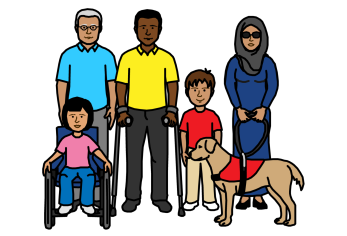
This information is for anyone with a disability who is homeless in Laguna Beach or who will move to Laguna Beach and be homeless.
This information tells you about:
- A court case that happened about the rights of people with disabilities who are homeless in Laguna Beach.
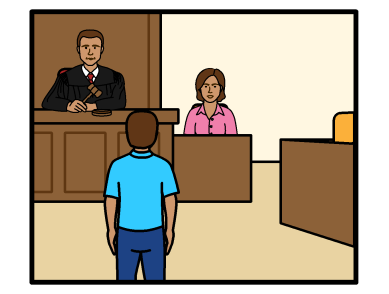
- An agreement that has been made about what should happen next.
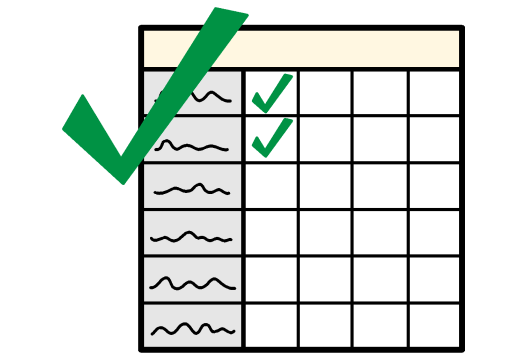
- How to find out more.
- How to say if you are unhappy with the agreement.

About the court case

In 2015, some people with disabilities who are homeless in Laguna Beach went to court.
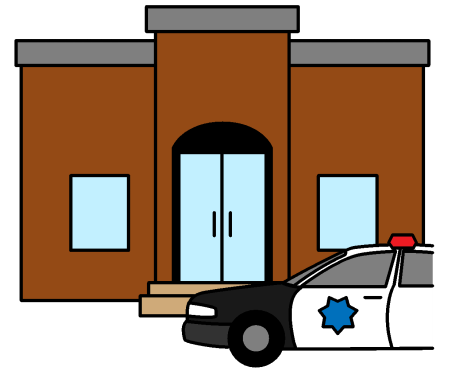
They were unhappy with the City of Laguna Beach and the police in Laguna Beach.
They went to court because they thought that:
- Some services for homeless people were not right for people with disabilities.
For example, they were hard to use and did not give people the right support.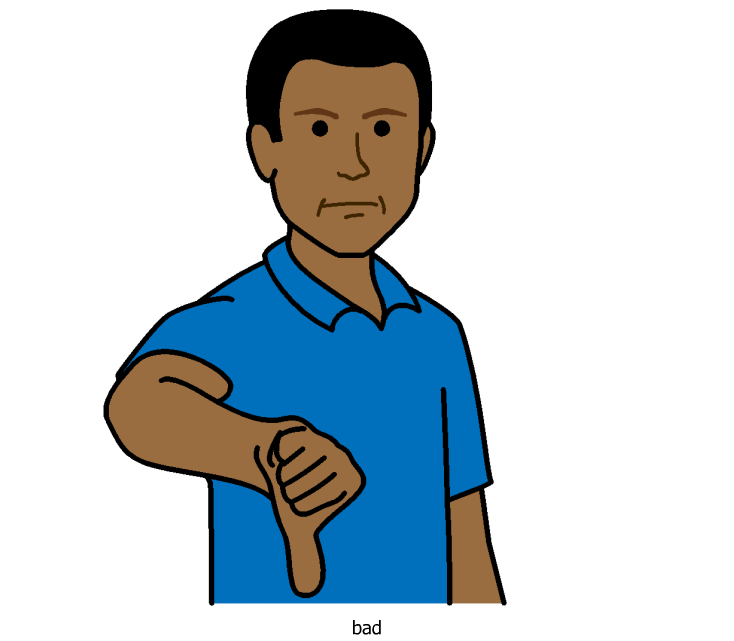
- The City of Laguna Beach and the police stopped some people with disabilities from sleeping in public places like parks and beaches.
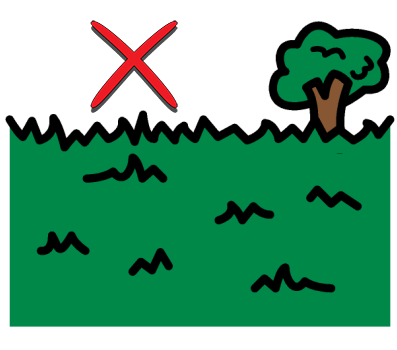
- The City of Laguna Beach and the police put people with disabilities who are homeless in more danger.
They have also broken some laws called:- The Americans with Disabilities Act
- The Rehabilitation Act
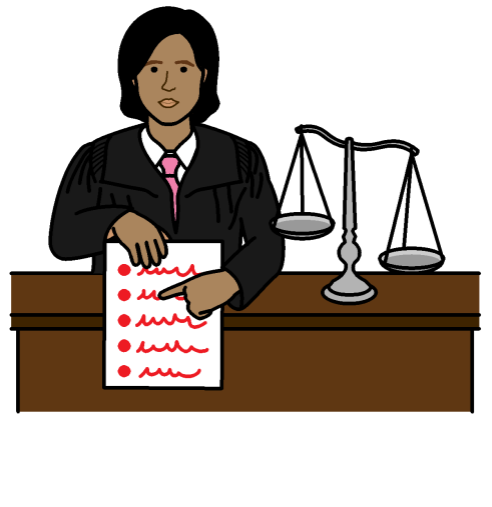
This is what the people with disabilities thought.
The City of Laguna Beach and the police do not agree with this.
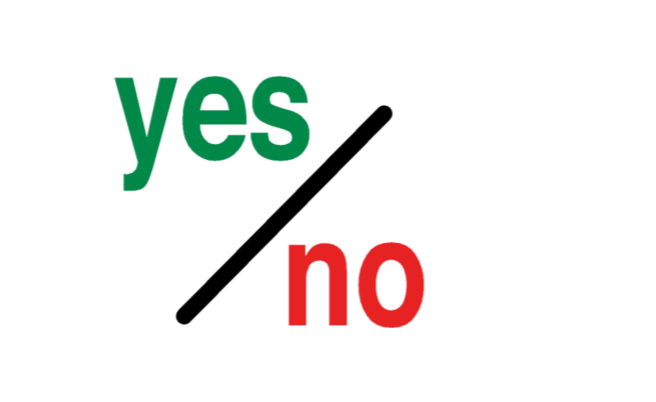
What did people with disabilities ask the court?
The people who went to court wanted the City of Laguna Beach and the police to:
- Stop using laws to stop people with disabilities from sleeping in public places.

- Make City of Laguna Beach services easy for people with disabilities who are homeless to use.
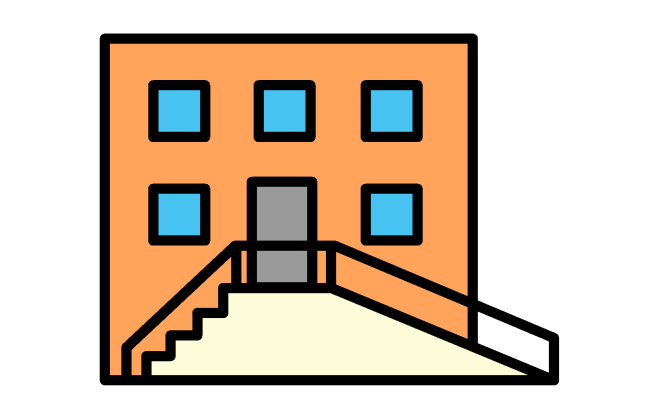
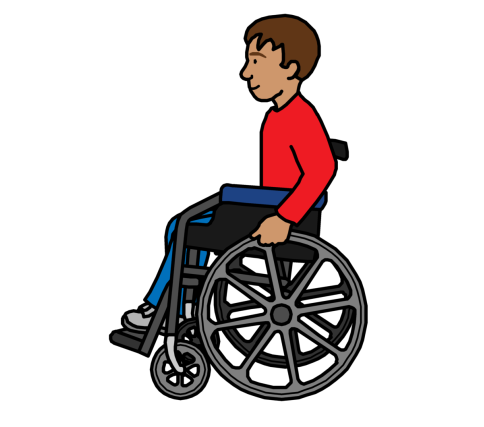
Instead of going to court for a trial, everyone in the court case made an agreement about what should happen next.
The court will decide if this agreement will go ahead.

What does the agreement say?
We will tell you the main things in the agreement.
Go to aclusocal.org/glover to see the whole agreement.
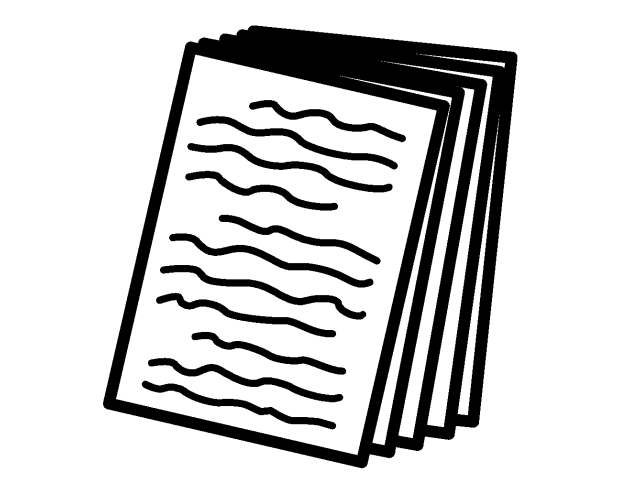
The agreement is about all people with a disability who are homeless who live in Laguna Beach or will move there.

The main things the agreement says
Some police staff who work with groups of people in Laguna Beach will:
The City of Laguna Beach will look at other training for police officers.
- Both sides in the court case will say in public that they agree with some work that the City of Laguna Beach is doing for homeless people.
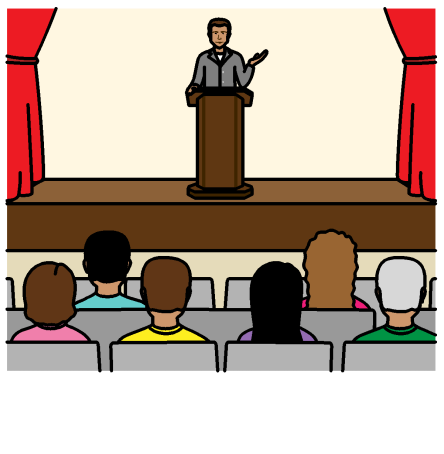
- Someone in charge of making services easy to use.
The City of Laguna Beach will still have someone in charge of making services easy for people with disabilities to use.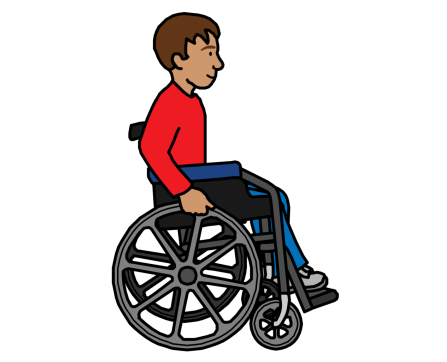
This includes the City's shelter for homeless people called the ASL shelter. It is at 20652 Laguna Canyon Road.
This person is called an ADA Coordinator.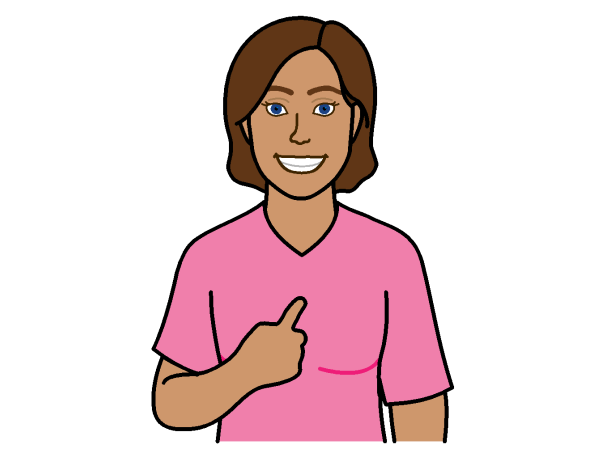
They have training about the rights of people with disabilities.
They will have some more work to do for the ASL shelter. - Asking for changes to be made or making a complaint.
Some people with disabilities may need to ask for extra support for their disability.

And some people may want to complain if they think the City of Laguna Beach or the police have treated them unfairly because of their disability.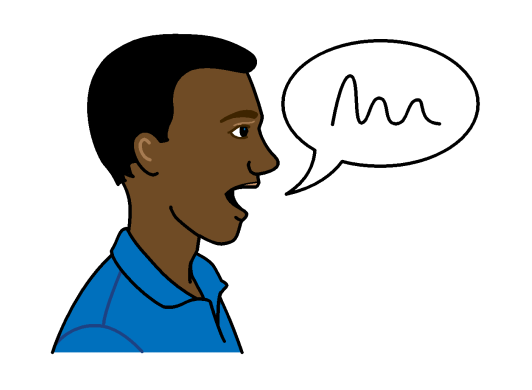
The City of Laguna Beach has some rules for people to follow about this.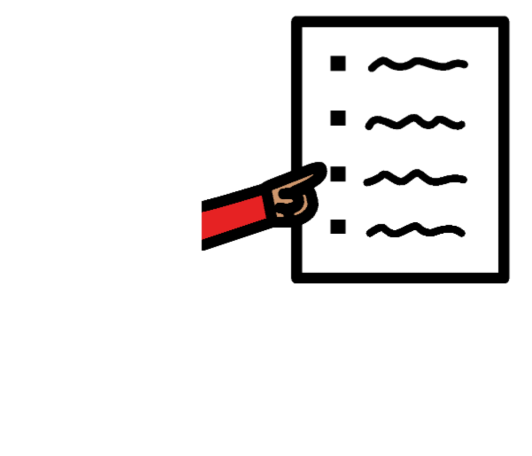
The City of Laguna Beach will make sure the police have these rules.
The City of Laguna Beach will make rules like this for the ASL shelter.
These rules will be at the ASL shelter for people to see. - The ASL shelter and how it works
People with disabilities can ask the ASL shelter to change something if they think it won't work for people with disabilities.
For example, this could be some rules about the shelter.
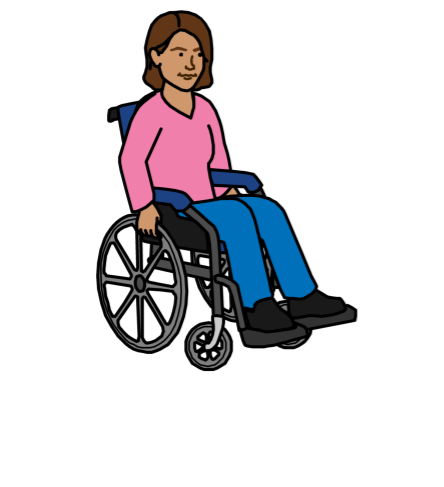
Staff at the ASL shelter have to look at what people with disabilities ask for and see if it is possible.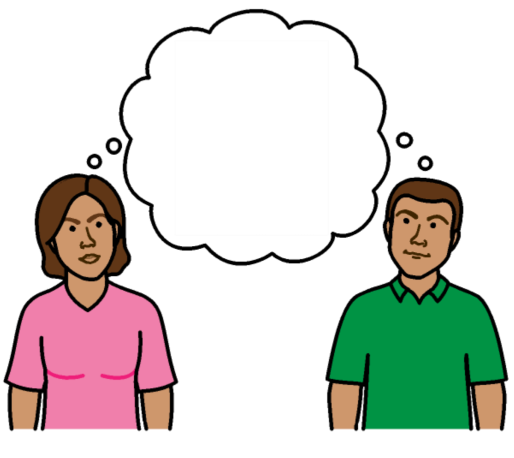
People with disabilities can say if they don't agree with the ASL shelter's decision.
They can tell the ADA Coordinator. This person works for the City Of Laguna Beach.
The ADA Coordinator will tell staff at the ASL shelter to change the decision if they think it is wrong.
The City of Laguna Beach and staff at the ASL shelter will help people with disabilities know about these rights.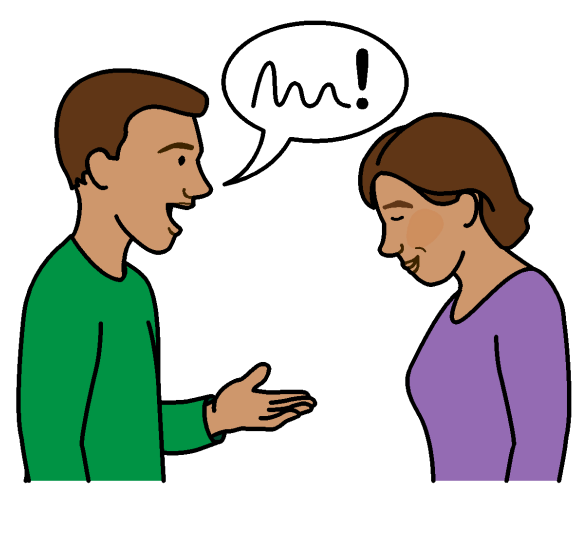
There will be some support for people with disabilities at the ASL shelter:- There will be at least 3 areas to sleep in that are more private for people with disabilities who need it.
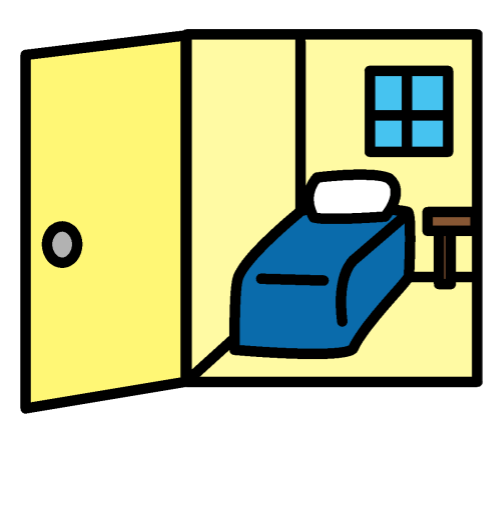
Or transport to another shelter that has private areas to sleep in.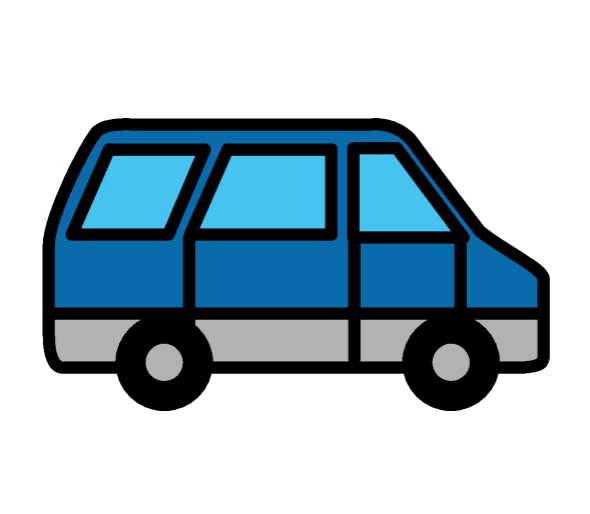
The ASL shelter will test this out first. - There will be at least 4 beds or cots for people with disabilities who need them.
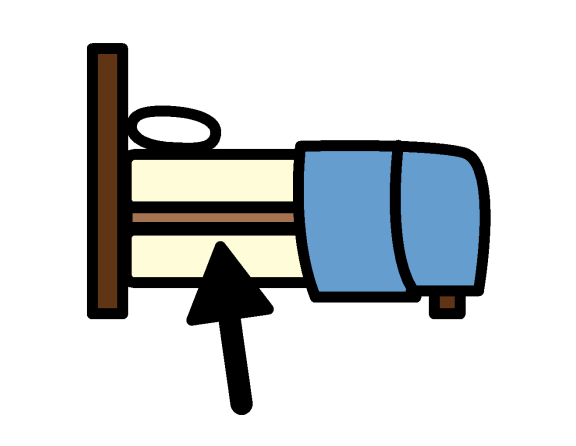
- People with disabilities will be able to plug in electrical equipment for their disability.
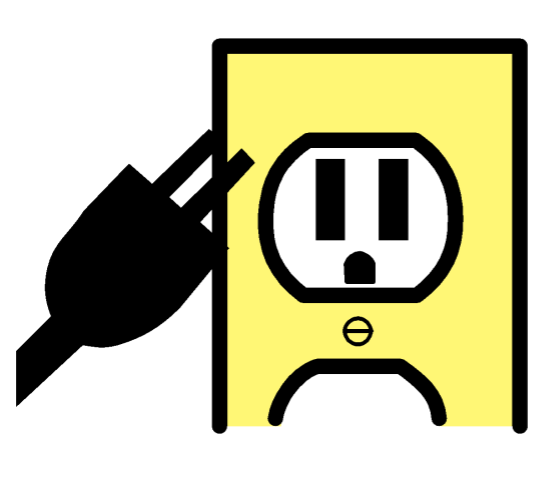
- There will be fridges to put medicine in.
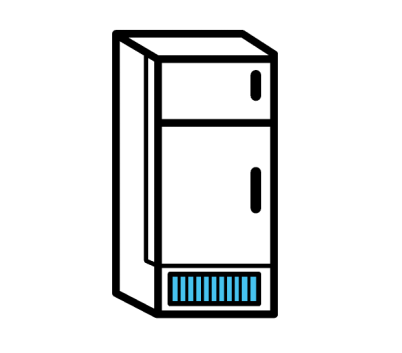

- People with disabilities will be able to leave or enter the ASL shelter if they need to. Staff will say how this will work.
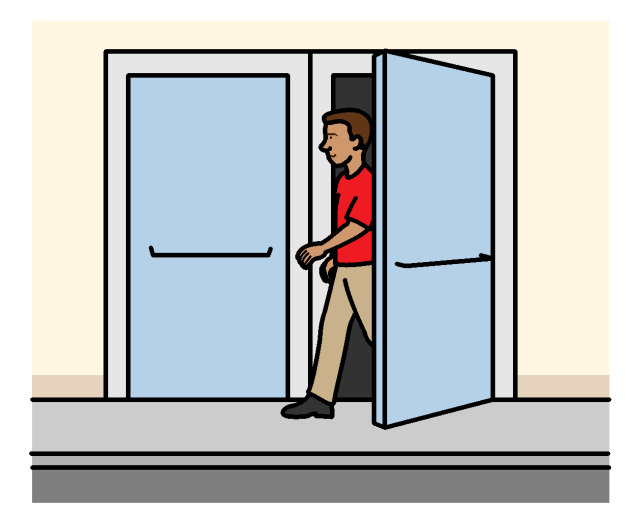
The ASL shelter will put up rules about using the bathroom. The rules will include support for people with disabilities.

The City of Laguna Beach and the ASL shelter will help make it easier for people with disabilities to:
- Get into the ASL shelter.
- Know if they can stay there overnight.

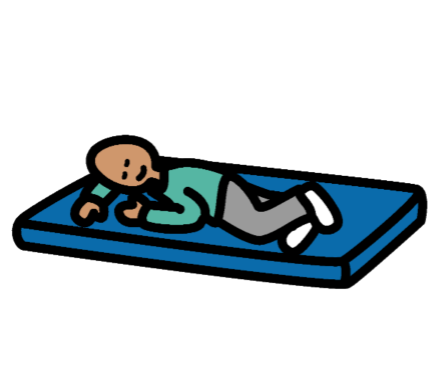
The ASL shelter will try out a new way of doing this.
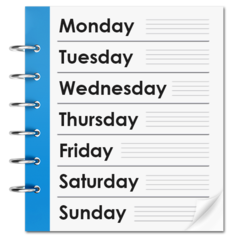
For example, there will be places at the ASL shelter for some people for up to 30 days. People may be able to stay longer.

Staff at the ASL shelter will still get training to help them support people with disabilities.
The ASL shelter will still have a case manager who will work with people to try to get the support they need.
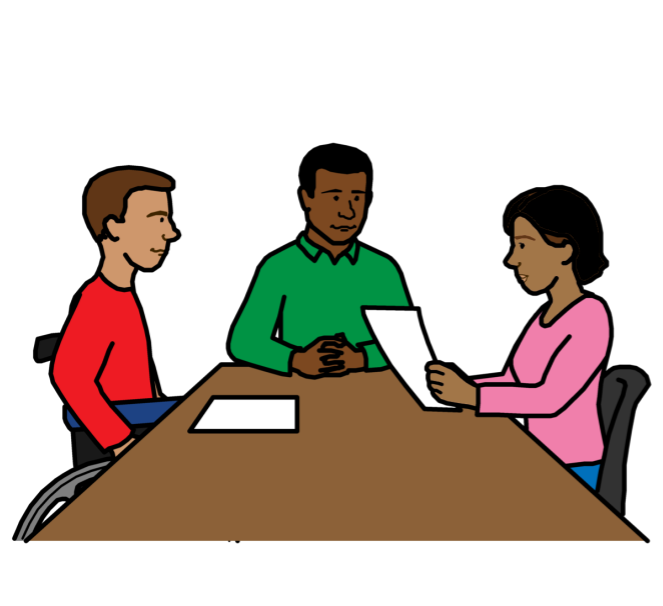
The ASL will do this if it gets enough money for this work.
The ASL shelter will change its rules about:
- People's rights and the things they must do if they stay at the shelter.
- How people who were kicked out of the shelter for good can get back in.

The ASL shelter will have clear rules about who will have to leave the shelter for bad behavior.
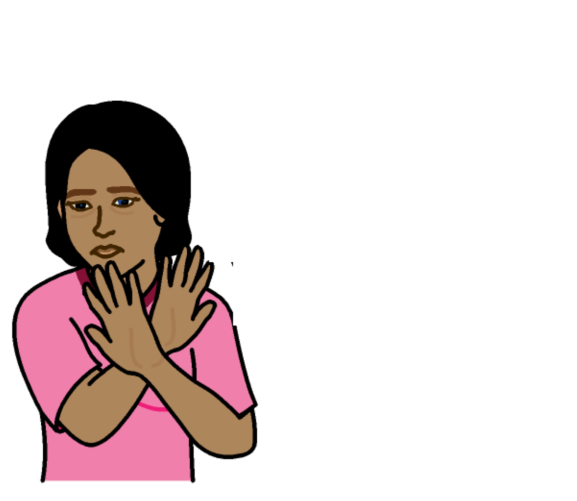
People with disabilities will only have to leave because of their disability if they put other people in danger or use illegal drugs.
If someone has to leave the ASL shelter it will be written down. The person who leaves will get a copy of this.
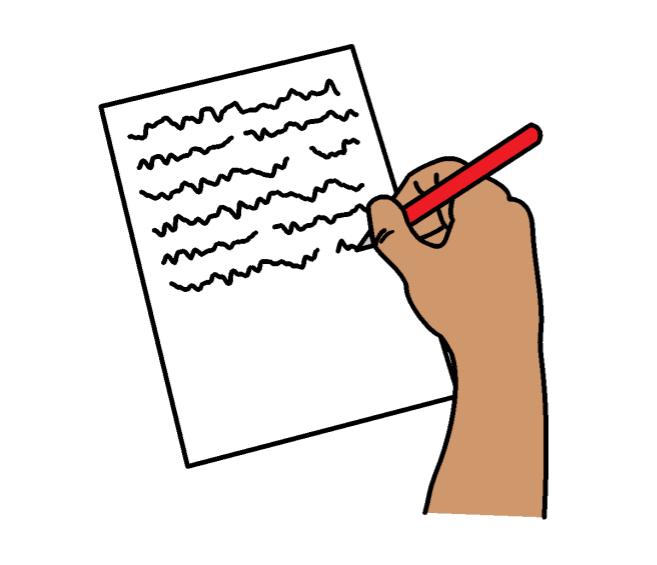
The ASL shelter will post all these rules so people can see them.
- There will be at least 3 areas to sleep in that are more private for people with disabilities who need it.
- The Laguna Beach police
- Keep up to date with the disabilities that people who are homeless may have.
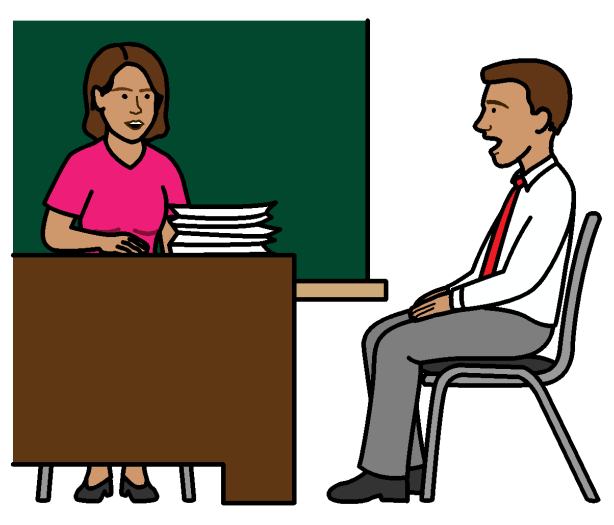
- Work with the ADA coordinator. This person works to make services easy for people with disabilities to use.

- Help people with disabilities know what to do if they want to make a complaint.
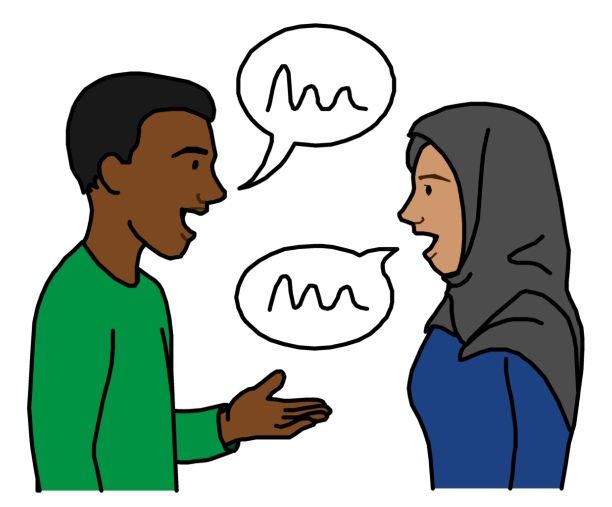
- Keep up to date with the disabilities that people who are homeless may have.
- Transport
The van that takes people with disabilities to and from the ASL shelter will have a ramp or lift.
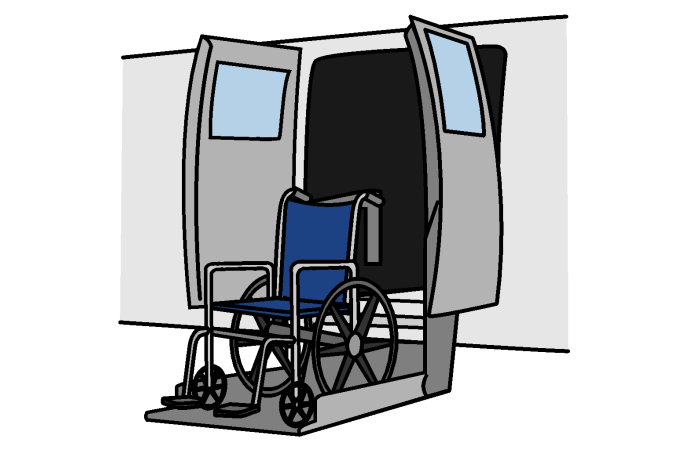
- Jobs and work
The City of Laguna Beach will post any jobs they have open at the ASL shelter so people can see them.

People with disabilities who are homeless in Laguna Beach cannot go to court again about the same or similar issues.
This will only happen if the court says yes to the agreement.

To find out more or say you are not happy with this agreement
You can't get money from this agreement or court case.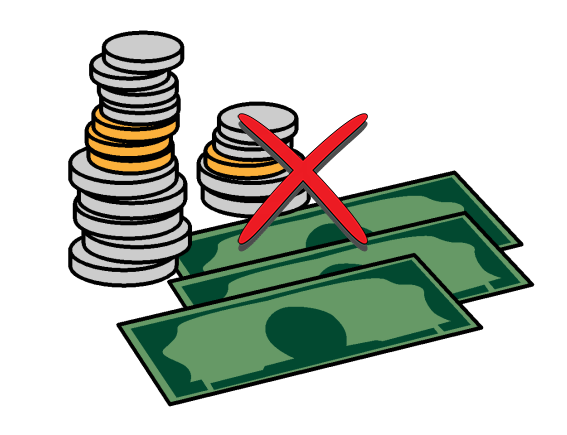
But you can find out more or say you are unhappy with the agreement.
You can look at this website for more information:
The website will give you:
- A list of lawyers working for people with disabilities in this court case.
- A copy of the whole agreement for this court case.
- The date that the court will meet to look at the agreement.
To ask questions about the agreement you can:
Call this number and leave a message:
714-221-2788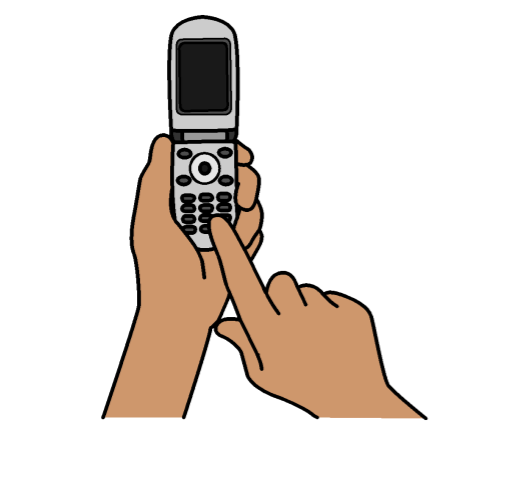
Send a letter to:
Glover Plaintiffs' Class Counsel
c/o ACLU of Southern California
1313 West 8th Street
Los Angeles CA 90017
Or send an email to:
If you are happy with the agreement you don't have to do anything.
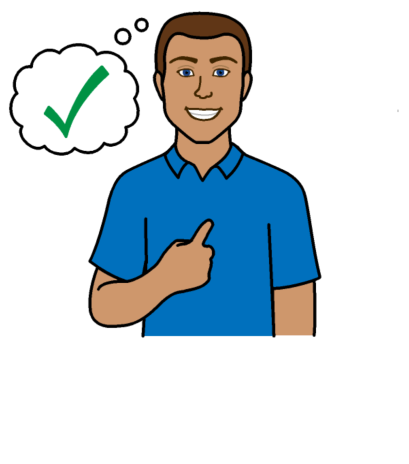
If you are not happy with the agreement:
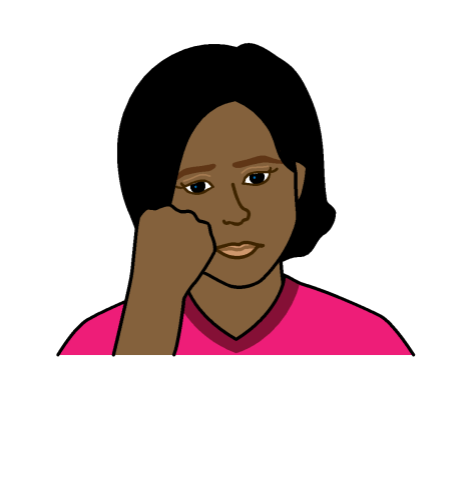
You must put something in writing to say which parts you don't agree with and why.
You must do this by: September 17, 2018
You must also include:

- Your name
- Your address if you have one
- Your phone number if you have one
- The name of this court case. It is called Glover v. Laguna Beach.
You must sign your name on your paper.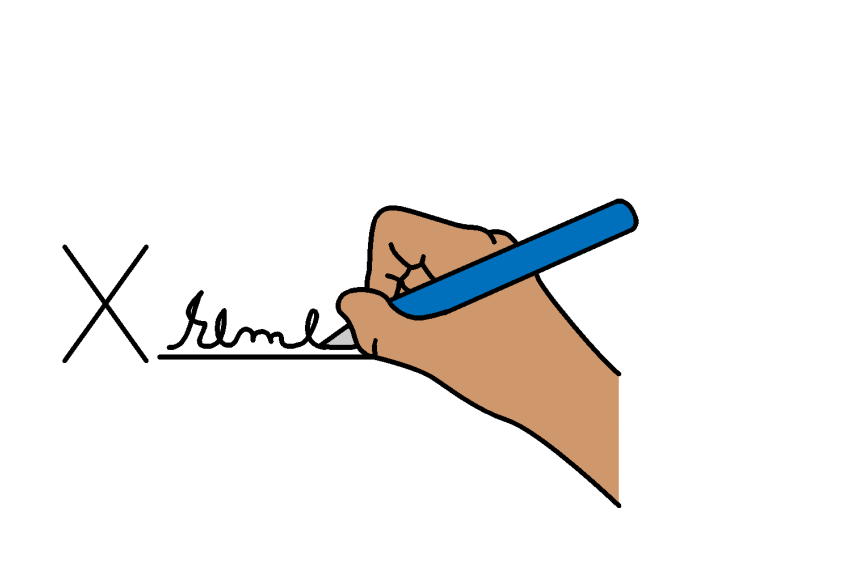
Please mail your paper to:
Glover Class Counsel
c/o ACLU of Southern California
1313 West 8th Street
Los Angeles CA 90017
Your paper will be seen by the judge and some lawyers working on the case.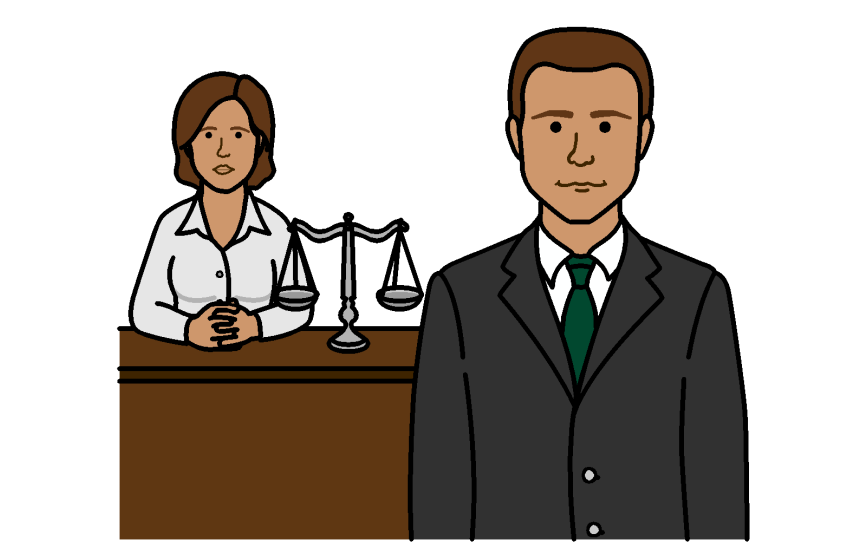
If the court says yes to the agreement, then it will happen. You can't change it.
What happens next?
The court will meet to decide if the agreement will happen on November 5, 2018
This date may change.
There will be information about the date on the websites we gave you before.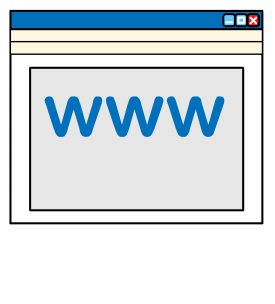
Some people who are unhappy with the agreement may be able to speak at the meeting if the court agrees.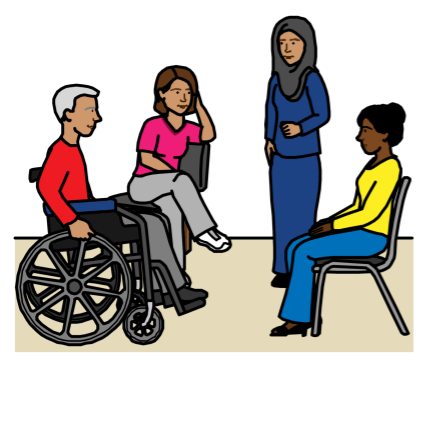
The court address is:
U.S. Federal District Court, Courtroom 10 D
411 West 4th Street
Santa Ana, CA 92701-4516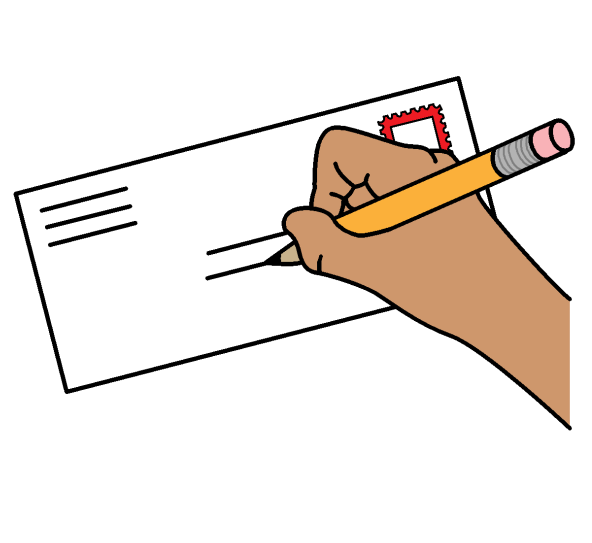
Download this information in a PDF document.
Learn more about the Glover v. City of Laguna Beach case.
